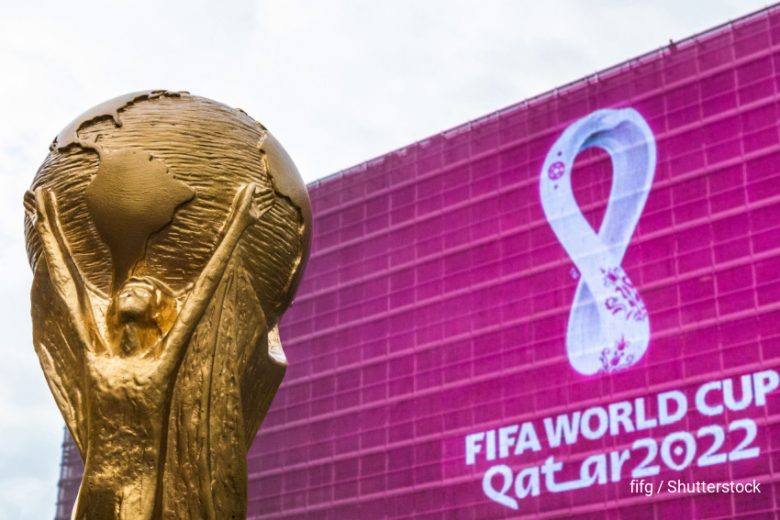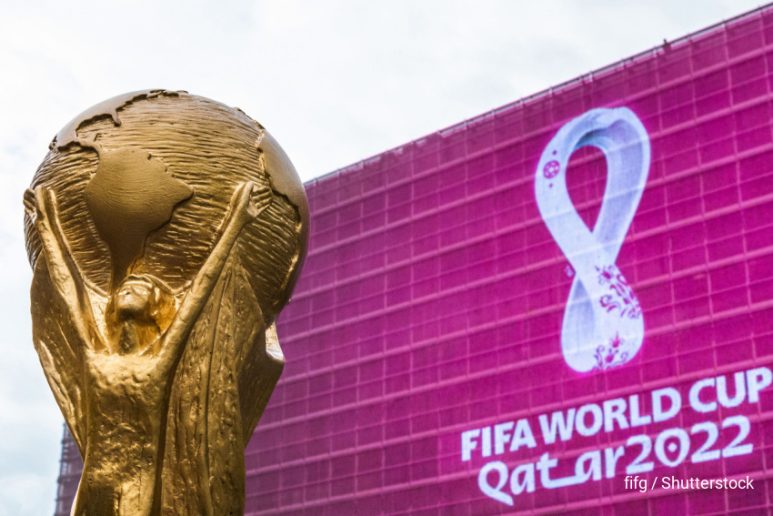By Joseph Monaghan
On 18 December 2022 football fans around the world rejoiced as Argentina won the FIFA World Cup 2022 during what was described as the ‘best World Cup final ever’. Argentinian newspapers were discussing how Lionel Messi ‘fulfilled a destiny which has been his since before birth and has brought spring back to Argentina’. The French media on the other hand thanked the French National team and tried to keep their morale high while both the French President, Emmanuel Macron and the French Prime Minister, Élisabeth Borne, thanked the national team for ‘making [them] dream’.
Despite the exciting final game there has been a dark cloud hanging over the World Cup taking place in Qatar since its announcement in 2010. From bribery accusations to the treatment of migrant workers and the state of human rights in the country, this year’s event has been full of controversy from the beginning. Sepp Blatter, the then-president of FIFA told a reporter that LGBTQ+ attendees of the event “should refrain from any sexual activities” in the socially conservative country, where there are no human rights protections for LGBTQ+ people. This comment prompted a backlash against FIFA as well as the Qatari government on the social issue of homophobia in the country. The issue of women’s rights has also been debated. Human Rights Watch reported in 2021 that a woman’s legal situation is that she has to ask permission from a male guardian if she wishes to marry, study abroad or receive certain types of reproductive health care in Qatar. However, the most frequent criticism of the World Cup being held in Qatar centres on the treatment of migrant workers in the country. In the lead up to the event, the country was criticised for the perceived failure of authorities to investigate the deaths of migrant workers.

When it comes to freedom of expression and press freedom, the small Gulf nation does not have the best record. The country ranks 119/180 at the Reporters without Borders Index which mentions that despite the fact that Qatar has built a media empire, ‘covering domestic political issues, remains a real challenge for journalists’. According to Amnesty International:
“The Qatari authorities use abusive laws to stifle those who are critical of the state, including both citizens and migrant workers. Amnesty International has documented cases of Qatari citizens who have been arbitrarily detained after criticizing the government, and sentenced following unfair trials based on confessions obtained coercively. Meanwhile, Malcolm Bidali, a Kenyan security guard, blogger and migrants’ rights activist, was forcibly disappeared and held in solitary confinement for a month for highlighting the plight of migrant workers.
Qatar has little independent or critical media. The country’s authorities limit press freedom by imposing restrictions on broadcasters, including by banning filming in certain locations such as government buildings, hospitals, universities, migrant workers’ accommodation sites and private homes.”
So how has the media reported these issues?
As time approached, media analysts focused on how the media would cover this year’s World Cup. In an interview for the University of Salford’s news section, Paul Broster, Associate Dean of the School of Arts, Media and Creative Technology at the University of Salford mentioned that this year’s reporting would be much different because the World Cup was not a regular one:
“The usual sports coverage will be there but news around wider issues will be more prominent than in other tournaments. We have already seen with just days to go an apparent last minute decision to stop alcohol sales in the stadiums. That led major news websites at the time rather than Gareth Southgate’s team dilemmas. It will ebb and flow between sport and news much more than usual.”
In the UK the media did not shy away from covering human rights abuses in Qatar.. During the opening ceremony the BBC covered the treatment of migrant workers and LGBTQ+ rights in the country.
During the opening ceremony former footballer and Match of the Day presenter, Gary Lineker, emphasised the controversies surrounding the event:
“Ever since FIFA chose Qatar back in 2010, the smallest nation to have hosted football’s greatest competition has faced some big questions – from accusations of corruption in the bidding process to the treatment of migrant workers who built the stadiums where many lost their lives. Homosexuality is illegal here. Women’s rights and freedom of expression are in the spotlight. Also, the decision six years ago to switch the World Cup from summer to winter.”
In 2016, Tal Samuel-Azran, Inbal Assaf, Annie Salem, Loreen Wahabe, and Nadine Halabi published an academic article that looked at the way the World Cup 2022 winning bid was covered by the media. Their analysis revealed a huge gap in reporting standards among Al Jazeera English, Al Jazeera America and Al Jazeera Arabic mentioning that Al Jazeera Arabic almost never criticizes its Qatari sponsor. The same type of coverage is being noticed this year as well.
During this year’s World Cup, Qatari state-owned news outlet Al Jazeera has taken a subtle angle in its approach.
It only takes one Google search on the issue to see that many of the opinion pieces from Al Jazeera on the subject of the FIFA World Cup adopt a pro-Qatar angle. Larbi Sadiki proposes that the tournament being held in Qatar will “shatter colonial myths”. An article that focuses on football teams staging on-field protests during the World Cup qualifiers does not give much of a voice to the football teams to explain their protests , but instead gives voice to Qatar’s government, saying that “the mortality rate among these communities is within the expected range for the size and demographics of the population”. Much more focus is given to Qatar’s response, with particular attention paid to supposed changes to their labour laws in 2020, many years after the World Cup’s news of the host country being announced.
The problem with Al Jazeera’s journalism regarding the Qatari government is that one could argue the subtle angling of stories not only affects trust in a news outlet on perhaps a more international level but also means that on a national level, human rights issues which should be transparently and thoroughly examined instead receive a “lukewarm’ treatment.
According to Reporters without Borders:
“The state-funded Al Jazeera TV news channel has considerable resources and a pool of presenters who are paid well enough to ignore subjects that could embarrass their employer. Some of their star presenters are extremely popular in the Arab world.”
We can also find that alongside what could very well be a lack of journalistic freedom at Al Jazeera when it comes to media law and reporting on human rights issues, FIFA as an organisation itself has often been deflective and defensive when critiqued on LGBTQ+, women’s and workers’ rights within Qatar.
The FIFA president has argued that much of the rest of the world is in no place to criticise Qatar specifically for their human rights record. This follows much of FIFA’s overall disposition on the subject, an “every country has flaws” type of deflection. In an attack on critics in November 2022, Gianni Infantino, president since 2016, argued that much of the criticism of FIFA and of Qatar was a “one-sided moral lesson” and “hypocrisy”. Amnesty regarded this as “treating demands for equality as part of a culture war”.
Photo Credits: fifg / Shutterstock

